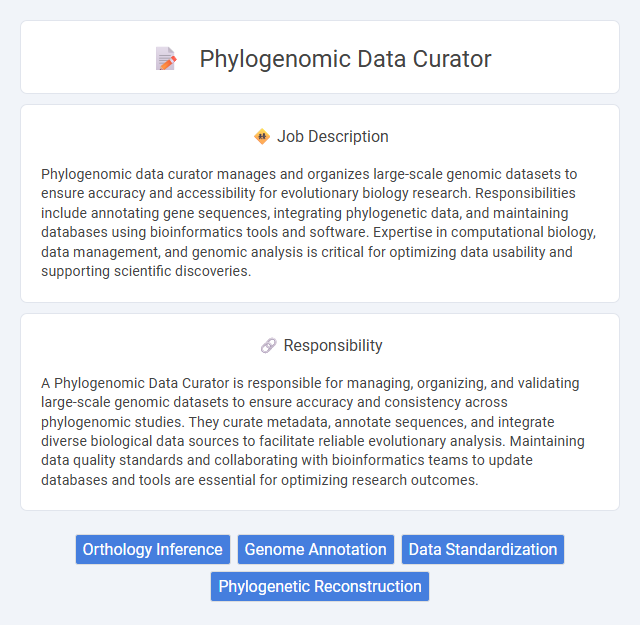
Phylogenomic data curator manages and organizes large-scale genomic datasets to ensure accuracy and accessibility for evolutionary biology research. Responsibilities include annotating gene sequences, integrating phylogenetic data, and maintaining databases using bioinformatics tools and software. Expertise in computational biology, data management, and genomic analysis is critical for optimizing data usability and supporting scientific discoveries.
Individuals with strong analytical skills and a background in biology or bioinformatics are likely suitable for a phylogenomic data curator role, as the job involves managing complex genomic datasets. Candidates comfortable with data interpretation, attention to detail, and proficiency in programming or database management probably fit well in this position. Those without a passion for research or difficulty working with large-scale data might find this role less suitable.
Qualification
A Phylogenomic data curator must possess a strong background in bioinformatics, evolutionary biology, and data management, typically requiring a degree in computational biology or a related field. Proficiency in handling large-scale genomic datasets, expertise in phylogenetic analysis tools, and familiarity with database curation standards are essential qualifications. Experience with programming languages such as Python or R, and knowledge of genome assembly and annotation processes, further enhance the candidate's capability to manage and curate complex phylogenomic data accurately.
Responsibility
A Phylogenomic Data Curator is responsible for managing, organizing, and validating large-scale genomic datasets to ensure accuracy and consistency across phylogenomic studies. They curate metadata, annotate sequences, and integrate diverse biological data sources to facilitate reliable evolutionary analysis. Maintaining data quality standards and collaborating with bioinformatics teams to update databases and tools are essential for optimizing research outcomes.
Benefit
A Phylogenomic data curator likely enhances research efficiency by organizing complex genomic datasets, which can improve data accessibility and accuracy. This role probably supports collaborative scientific discoveries through meticulous data management and annotation. The position might offer opportunities for professional growth in bioinformatics and evolutionary biology.
Challenge
The role of a Phylogenomic data curator likely involves managing vast and complex datasets derived from genomic sequences, which can present significant challenges in maintaining data accuracy and consistency. Ensuring the integration and annotation of heterogeneous data sources could prove demanding, requiring strong attention to detail and expertise in bioinformatics tools. Navigating evolving standards and keeping datasets up-to-date may further complicate the curation process.
Career Advancement
A Phylogenomic Data Curator specializes in organizing and managing large-scale genomic datasets to support evolutionary biology research, ensuring data integrity and accessibility. Expertise in bioinformatics tools and databases enhances career progression opportunities, enabling transitions into senior data scientist or research analyst roles within genomics and biotechnology firms. Continuous skill development in computational methods and phylogenetic analysis is critical for leadership positions and contributions to groundbreaking scientific projects.
Key Terms
Orthology Inference
A Phylogenomic data curator specializing in Orthology Inference systematically processes and annotates genomic datasets to identify evolutionary relationships between genes across different species. This role involves integrating sequence alignment data, phylogenetic trees, and functional genomics to accurately predict orthologous gene groups essential for comparative genomics and evolutionary studies. Expertise in bioinformatics tools and databases such as OrthoFinder, OMA, and PhyloTree is critical to ensure high-quality, curated phylogenomic datasets for downstream research applications.
Genome Annotation
Genome Annotation is a critical responsibility for a Phylogenomic Data Curator, involving the precise identification and classification of genes within genomic sequences to enhance the accuracy of phylogenetic analyses. The curator applies advanced bioinformatics tools and algorithms to interpret raw genomic data, ensuring high-quality functional annotations and comparative genomics insights. Expertise in database management and evolutionary biology supports the integration of annotated genomic information into public repositories for broader scientific use.
Data Standardization
A Phylogenomic data curator specializes in the organization and standardization of complex genomic datasets to ensure consistency and interoperability across research platforms. Proficient in metadata annotation, they implement standardized ontologies and controlled vocabularies to enhance data integration and retrieval efficiency. Their role is critical in facilitating accurate phylogenetic analyses by maintaining high-quality, well-structured data repositories compliant with community-driven standards.
Phylogenetic Reconstruction
Phylogenomic data curators specializing in phylogenetic reconstruction manage and analyze large-scale genomic datasets to infer evolutionary relationships among species. They employ advanced bioinformatics tools and algorithms, such as maximum likelihood and Bayesian inference methods, to build accurate phylogenetic trees. Expertise in genome assembly, sequence alignment, and database management is critical for ensuring data integrity and facilitating comparative genomics research.
 kuljobs.com
kuljobs.com